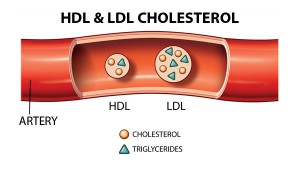Types of Cholesterol
 Understanding cholesterol for your healthy heart
Understanding cholesterol for your healthy heart
There are a number of fats, or lipids, that naturally circulate in the bloodstream. Here is a brief overview of cholesterol basics or the main types of cholesterol that you hear about most often including HDL cholesterol and LDL cholesterol.
What is total cholesterol?
- Total cholesterol is a total measure of the fats found in the blood, which include high-density lipoprotein (HDL) cholesterol, low-density lipoprotein (LDL) cholesterol, and triglycerides3
- A desirable level of total cholesterol in your blood is less than 200 mg/dL3
What are lipoproteins?
- Lipoproteins are particles in the body that are made up of cholesterol and protein. Lipoproteins help move cholesterol through the bloodstream3
What are the different types of cholesterol?
- High-density lipoprotein (HDL) cholesterol3
- HDL cholesterol is also known as good cholesterol because it is thought to help move cholesterol out of the arteries and into the liver so the body can get rid of it
- HDL is an important factor in heart health
- With HDL, higher numbers are better; a normal level of HDL is higher than 40 mg/dL4
- Low-density lipoprotein (LDL) cholesterol3
- LDL cholesterol is also known as bad cholesterol because it accumulates on artery walls and forms a plaque-like substance
- An optimal level of LDL cholesterol in your blood is less than 100 mg/dL4


